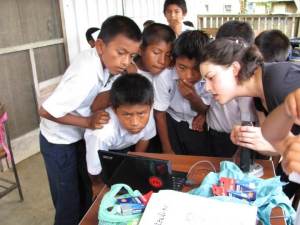Written by Andrew Smith & Jordan Teague; Hand-drawn images by Ashby Strassburger, EWB-DC Cameroon Education Subgroup Members
As noted in the previous posts, the EWB traveling team is spending their time conducting both engineering and public health assessments for the people of Mbokop. In addition to this there is an equally important task that the team is starting which ties closely with both of the other areas and that is education, specifically concerning good sanitation and hygiene behaviors. This undertaking is necessary for the effectiveness and sustainability of any engineering solution developed in the future and thus is absolutely critical to the overall success of the project. Just as important, it reinforces the principle that EWB-DC and the community of Mbokop are partners and that we want to equip them to take ownership of this project and to empower them to continue to improve their community even after our partnership comes to its conclusion.

Showing Kids Microbes with a Digital Microscop in an Panamanian community for an EWB project. A similar microscope was carried by the team to Mbokop.
The methods and approaches we formulated for community education varied quite a bit over the months we prepared for the team’s assessment trip. This was a result of learning more about techniques and strategies for effective education as well as learning more about the people of Mbokop from our in country contacts. Initially, several “modules” were adapted from the Participatory Health and Sanitation Training (PHAST) system developed by the World Health Organization. This methodology places an emphasis on providing basic sanitation information and then acting as facilitators of discussion rather than just lecture the community on what they should do. This approach allows the community to make their own decisions to improve their health and simultaneously empowers them to handle other health issues as they arise. Much of this prepared material had to be pared down and adjusted in order to accommodate less formal gatherings that would be more likely while the team is in the community. While this material is geared mainly to the adult population, we also wanted to make sure that we also reached out to the children of the community.
Children, no matter where they live, are naturally inquisitive and eager to learn. They constantly ask, “Why?” and genuinely want to know! It is also known that personal hygiene habits are usually acquired during childhood, and it is during this time that behavior change is easiest. To teach such practices as handwashing at an early age is to ensure the lifelong practice of handwashing. This takes a much longer time, but it is easier than trying to teach adults how to change their behaviors! The children take their newly learned behaviors back to their households, and can facilitate behavior change of the entire family – making this investment in children multiply.
The EWB-DC Cameroon team developed health and hygiene education material for the children of Mbokop using the CHAST method (similar to PHAST). This method appeals to four key motivations in hygiene behavior: affiliation, status, disgust, and morality. Using games, skits, and puppets, they will establish the children’s current hygiene practices, identify good and bad hygiene behaviors, and understand how to practice good hygiene behaviors. The children will be taught how to block the routes of germs, the proper way to wash their hands, and the proper way to use the type of latrines they have in the village. There are also fun activities involving Glo Germ, songs, and microscopes! Through these education modules, the children of Mbokop will learn lifelong hygiene practices and have fun in the process!
Currently, due to the limited time with the community the main priority is building a solid relationship with the community in order to build the trust necessary for true education to thrive. However, the team will spend time training the water committee to test water for presence of E. coli as well as preparing them to handle the logistics and implemention any future water system. As we build our relationship with the community and return to Mbokop in future trips, we hope to expand the education to the community at large. In the interim, we have partnered with an NGO based in Cameroon, HEDECS, which specializes in hygiene and sanitation education. It is our hope that HEDECS will be able to continue educating the community between our trips and that we can continue to provide the knowledge necessary to implement an effective, sustainable improvement to the quality of life for people in Mbokop.

